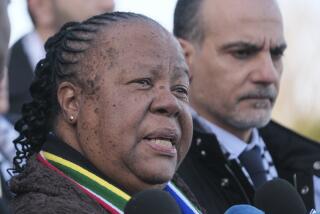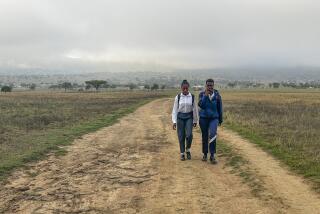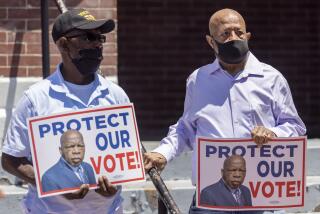From the archives: South Africa Blacks, Students Protest on Eve of Vote
JOHANNESBURG, South Africa -- Police using whips and dogs broke up a protest march Tuesday in the sleepy white college town of Stellenbosch, and hundreds of thousands of voteless blacks nationwide began a two-day strike on the eve of elections that will be the most severe test of white support for the government since it came to power 41 years ago.
South African whites will cast ballots today in parliamentary elections that have been upstaged internationally by attempts to crush a monthlong black defiance campaign organized to discredit the voting and protest apartheid laws and police curbs on peaceful protest.
Acting President Frederik W. de Klerk’s National Party is favored to extend its rule for five more years with a slim majority in the controlling white chamber of Parliament, which includes less powerful houses for mixed-race Coloreds and Indians but no representation for blacks.
Could Lose Quarter of Seats
The National Party’s own leaders predict that it could lose up to a fourth of its seats to the right-wing Conservative Party and the liberal Democratic Party. Such a swing would affect De Klerk’s pledge to lead the country away from the “distrust, suspicion and fear” that grip white and black South Africans.
At stake in the elections is the pace of reform in South Africa, where 26 million blacks are ruled by 5 million whites under the system of racial segregation called apartheid.
Many blacks consider the elections meaningless, and the call for workers and students to stay away capped a campaign of civil disobedience that has touched off dozens of bloody confrontations with the police, 1,600 arrests and, the government says, 70 unrest-related deaths.
“Any political activity that ignores black people is doomed,” said Anglican Archbishop Desmond M. Tutu, the 1984 Nobel Peace Prize laureate who has been arrested twice in the past week. “The driving force of change in this country lies among the disenfranchised, not in Parliament.”
On Tuesday, police dispersed more than 500 white students and black workers who marched from the University of Stellenbosch, the alma mater of most of South Africa’s white leaders, to the center of that town in the lush wine country near Cape Town. Demonstrators ran screaming through the streets when the police unleashed dogs. Some protesters were beaten with whips, and dozens were arrested.
In Pietermaritzburg, 450 college students and faculty members were arrested in a similar march, organized to present a petition calling for an end to police violence against peaceful protest.
Predict Spread of Strike
Black union leaders predicted that the worker strike would spread today, and most black, mixed-race and Indian students across the country were boycotting classes as well.
In an open letter to De Klerk on Tuesday, the Mass Democratic Movement, a loose affiliation of most anti-apartheid groups in the country, said the elections “still symbolize apartheid and the perpetuation of white minority rule. We therefore demand that our right to peaceful protest be respected. . . .”
The Mass Democratic Movement began the defiance campaign Aug. 2, when 270 ailing blacks sought treatment at whites-only hospitals. Since then, it has targeted whites-only beaches and schools as well as state-of-emergency laws that prohibit most anti-government activity from meetings to marches.
Meetings in churches were generally allowed by the government until Monday, when riot police blocked the doors of two churches in downtown Cape Town and arrested a dozen leading clerics, including Tutu and the Rev. Allan Boesak, the mixed-race president of the World Alliance of Reformed Churches. They were released after a few hours in jail.
Tutu Reconsecrates Cathedral
Tutu reconsecrated his cathedral Tuesday, telling parishioners that the police, in “a scandalous breach of religious liberty . . . sank to new depths when they desecrated my cathedral.”
The government has attempted to justify its crackdown by contending that the defiance campaign is orchestrated by the outlawed African National Congress to violently disrupt the elections. However, defiance leaders say they are using nonviolent protests to highlight the plight of the black majority.
Although the escalating unrest has sullied South Africa’s image overseas, many political analysts believe it may actually help the National Party in the elections by driving whites fearful of a black revolution away from the more liberal Democratic Party.
However, it may also slightly boost the far-right Conservative Party, which says the unrest is an example of the trouble the government can expect if it makes good on promises to dismantle apartheid.
Controls 123 of 166 Seats
The National Party now controls 123 of the 166 seats at stake in the white chamber of Parliament, while the Conservatives have 22 seats and the Democrats 20. National Party leaders concede that they may lose 20 to 30 seats, reducing their majority from the current 74% to as low as 56%.
Government opponents have predicted an even greater swing of seats, which would create a “hung Parliament” in which no party has an outright majority. In that case, the National Party would be forced to form an alliance with the right or the left, analysts say.
The Conservatives’ platform calls for stricter enforcement of apartheid and the partitioning of South Africa into separate white and black states. The Democrats support a one-person, one-vote system that would bring blacks into government on an equal footing with whites.
The National Party, which came to power in 1948 on a platform of strict racial segregation, has sought the political middle ground. While De Klerk remains committed to racially segregated schools, hospitals and residential areas, he has promised to start negotiations with black leaders and draw up a new constitution to share power but prevent “black domination.”
Voting for All 3 Houses
The voting is for all three houses of Parliament, the white chamber as well as smaller chambers representing the country’s 3 million mixed-race Coloreds and 1 million Indians.
Black leaders have declined to endorse any party.
“The elections are a non-issue,” said Hilda Ndude, Western Cape publicity secretary for the United Democratic Front, the 2-million-member anti-apartheid coalition banned from political activity.
“We’ve got our own program of action, election or no election,” Ndude said in an interview. “There’s no difference between the parties. Things will still be the same.”
South Africa Elections Seats At Stake in House of Assembly Parliament’s dominant 166-seat white chamber* Democratic Party Favors abolishing all segregation laws: 20 National Party Favors a five-year plan to bring blacks back into the political system: 123 Conservative Party Favors strengtheing of segregation laws: 22 Also at stake are 80 seats in another chamber for people of mixed-race and 40 seats.in a third chamber for Indians. These chambers have no power to overrule the white chamnberon matters of national policy. Eligible Voters Indians. 0.7 million: 12% Whites. 3.2 million: 56% Mixed-race. 1.8 million: 32% South Africa’s 26 million blacks are not allowed to vote. *Includes one seat held by a now-defunct moderate party.
More to Read
Start your day right
Sign up for Essential California for news, features and recommendations from the L.A. Times and beyond in your inbox six days a week.
You may occasionally receive promotional content from the Los Angeles Times.







